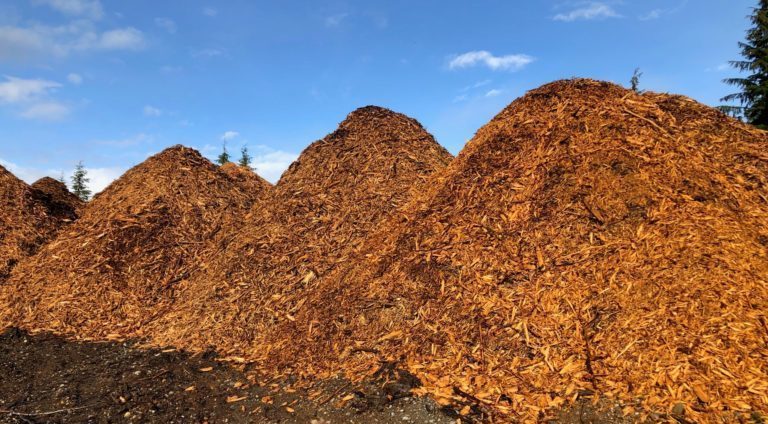
Ontario’s Bill 5 sparks new concerns where a legacy of environmental damage remains
The Protecting Ontario by Unleashing Our Economy Act exempts industry from provincial regulations — putting...
Huge swaths of northeast B.C. forests could be chopped down and ground up to make wood pellets to send overseas if the province approves a proposed logging licence transfer in Fort Nelson, B.C. Over one million cubic metres of intact forest every year could be logged for export, according to a Canadian Centre for Policy Alternatives report published on Wednesday.
Last November, B.C.’s largest forestry company, Canfor, quietly announced an agreement with Peak Renewables to sell its forest tenure in northeast B.C., pending approval from the province. Canfor held onto the tenure since closing its two Fort Nelson mills 13 years ago, putting around 600 people out of work.
If the licence transfer is approved, Peak Renewables would build the largest pellet plant in the province. Ben Parfitt, resource policy analyst for the Canadian Centre for Policy Alternatives, said the plant would, at best, employ around 60 people, while logging roughly the same amount Canfor logged when it employed 600 people. (Parfitt is also a freelance contributor to The Narwhal.)
Wood pellets are typically made with a combination of wood waste — unwanted or unusable trees cut down to access higher-quality wood — and by-products from mills like wood chips and sawdust. But Peak Renewables plans to log whole trees purely for pellets.
Producing pellets is quicker and simpler than processing trees for products like plywood and lumber, which means it offers less value in terms of employment.

Peak Renewables plans to log northeast B.C. forests and turn them into pellets to be burned for heat and energy overseas. Photo: Kim Haworth / Terrace Community Forest
Gary Fiege, president of the Public and Private Workers of Canada Union, which represents forestry workers, said the tenure transfer would be a mistake.
“We want to see more emphasis put on value-added manufacturing, as opposed to going to the bottom of the pile for our fibre, so to speak,” he said in an interview. “We need more value, not just in terms of the wood itself, but in what it brings to the communities and to the workers of this province.”
The Canadian Centre for Policy Alternatives, Conservation North and Stand.Earth are urging the province to delay its decision and consider transferring the tenure to the local First Nation.
A spokesperson for the Ministry of Forests told The Narwhal in an emailed statement the tenure transfer would potentially create jobs in the community and growth in the local economy.
The month-long public comment period was set to end on Feb. 19, but the ministry extended it to Feb. 26 after The Narwhal told the spokesperson people were concerned the period was too short.
Neither Canfor nor Peak Renewables responded to interview requests prior to publication.
In 2019, the province increased the amount of logging allowed in the Fort Nelson area to 2.58 million cubic metres per year, an increase of 58 per cent. According to the report, the province justified this in part by the lack of logging for more than a decade after Canfor shuttered its mills.
Parfitt said this created an incentive for Peak Renewables to make a proposal.
According to the report, the company would cut about 100 square kilometres of aspen and spruce forest every year. The aspen would be processed in Fort Nelson for pellets and the spruce trucked south to mills (including mills owned by Canfor) for processing.

Conservation North director and ecologist Michelle Connolly is concerned Peak Renewables is going to log primary forests for pellets. Photo: Taylor Roades / The Narwhal
Conservation North director and ecologist Michelle Connolly told The Narwhal the need to protect primary forests — forests that have never been logged — is urgent.
“We’re really concerned that these pellet plants would basically turn into vacuums for primary forest,” she said in an interview. She added that it’s not about stopping forestry, but said more care needs to be taken when considering where and how logging takes place, given how little primary forest is left in the province.
Fiege said he’s not against pellet production, but logging Fort Nelson forests to fuel a single pellet plant is not the best use for the trees. “There’s got to be a better way.”
Parfitt points out that the premier’s recent mandate letter to the new Minister of Forests, Katrine Conroy, includes a directive to lead a transition from “high-volume to high-value production.”
“If the government agrees to this transfer … that goes completely counter to the mandate that our forests minister has been given by the premier of the province,” Parfitt said.
He said instead of approving the logging licence transfer, the province could strengthen its relationship with the Fort Nelson First Nation and revitalize the local economy by declining the transfer, buying out Canfor and turning over the management of the forest to the nation and its non-Indigenous neighbours.
“This is a golden opportunity to do that, precisely because there has been no forest industry presence of any note in the region for well over a decade. This would be a time to actually give the Indigenous people in the region a strong mechanism for charting a new course.”
Get the inside scoop on The Narwhal’s environment and climate reporting by signing up for our free newsletter. On a warm September evening nearly 15...
Continue reading
The Protecting Ontario by Unleashing Our Economy Act exempts industry from provincial regulations — putting...

The Alberta premier’s separation rhetoric has been driven by the oil- and secession- focused Free...

Canada’s first-ever Indigenous governor general doesn’t play favourites among our majestic natural wonders, but she...
